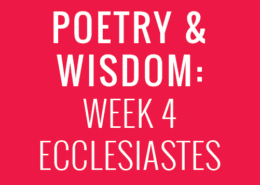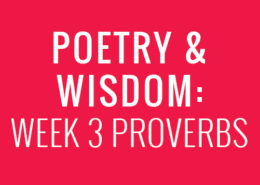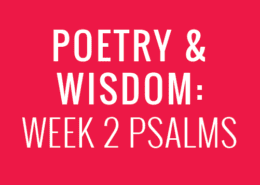
POETRY and WISDOM: WEEK 3 PROVERBS
Start with talking about Poetry and Wisdom.
As we look at Wisdom I want to challenge you and your audience to seek Wisdom so that you may have a greater understanding of who God is and what He wants from you. So, how do you get Wisdom?
First, desire Wisdom with all your might. Proverbs 4:8 says, “Prize her highly and she will exalt you; she will honor you for your embrace.”
Second, since Wisdom is found in the Word of God, we must apply ourselves in study and meditation to know the Word and to live it.
Third, we should pray for Wisdom. Solomon was not born a wise man. He prayed for wisdom and God said, “Because you have asked this and have not asked for yourself long life or riches or the life of your enemies, but have asked for yourself understanding to discern what is right, behold now I do according to your word” (1 Kings 3:11).
Fourth, biblical instruction for how to get Wisdom is to think of the shortness of this life and the infinite length of the next. Psalm 90:12 says, “So teach us to number our days that we may get a heart of wisdom.”
Finally, there is one last, absolutely essential thing to do if you want to “get Wisdom”: you must come to Jesus.
As we seek to understand Wisdom we are going to start by looking at the book of Proverbs. This book is the accumulation of wisdom from generations of godly, insightful people. It promotes a life of virtue and “fear of the Lord,” so that you can truly experience the good life. Proverbs is one of the three books that explore these themes of biblical Wisdom.
Then lead into a discussion about Wisdom. Plan to play this video and then ask questions and discuss.
Watch the video from us.
Review the notes below.
Proverbs are Wisdom sayings, and when we think of the Book of Proverbs in the Bible, we tend to think of it as a collection of wise sayings. But there is a lot more to Proverbs than spiritual one-liners.
The Wisdom in Proverbs is often described as a lady, but it’s not an impersonal force. It’s an attribute of God Himself. By fearing or respecting God and reading and obeying the wise, practical counsel found in this book, we will develop the important skills and moral mindset we need to live successful, good and godly lives in God’s world.
Proverbs 1:2-6 The purpose of these passages is to teach people Wisdom and discipline, to help them understand the insights of the wise. They teach people to live disciplined and successful lives, to help them do what is right, just, and fair. These proverbs will give insight to simple knowledge and discernment for the young. Let the wise listen to these proverbs and become even wiser. Let those with understanding receive guidance by exploring the meaning in these proverbs and parables, the words of the wise and their riddles.
The “beginning” is the “foundation” of all other wisdom. The first real “proverb” in Proverbs is that reverencing God is the first step and most important move toward true wisdom. It is the proverb by which all other proverbs are defined, the lens through which we should understand everything following it in the book. Reverencing God is the first step on the path toward living a life characterized by applying godly principles. A pivotal verse is Proverbs 1:7, which reads, “Fear of the Lord is the foundation of true knowledge, but fools despise wisdom and discipline.”
We live in God’s moral universe. Goodness and justice are objective realities we ignore to our own peril. The invitation of Proverbs is not to catch a few pithy statements, but to learn God’s Wisdom from previous generations of his people who have seen firsthand how bad life and society get when people ignore God and discard His principles. That is why the “fools” of Proverbs are not primarily unintelligent, but primarily disdainful of God and his word. Some of the world’s most intelligent people are “fools” in God’s eyes for this reason.
Proverbs by nature are based on probabilities. It is not a guarantee that everything in life will go well for you if you work at living righteously, or that God will instantly strike down every evildoer. Jesus says this isn’t the case in John 9:1-3 when his disciples assume that a man born blind is being punished by God for his sins or for his parents’ sins:
John 9:1-3 “As Jesus was walking along, he saw a man who had been blind from birth. “Rabbi,” his disciples asked him, “why was this man born blind? Was it because of his own sins or his parents’ sins?” “It was not because of his sins or his parents’ sins,” Jesus answered. “This happened so the power of God could be seen in him.”
So while many Proverbs instruct us to follow God, live wisely, care for the poor, etc., they are not guarantees that life will always go well for us if we practice goodness, or ill for us if we practice wickedness. Some wicked people are quite successful by the world’s standards.
Proverbs is about a life of applying God’s Wisdom. It is not just about discernment, but discernment in action. As you study Proverbs, don’t just read them or memorize them. Let their Wisdom seep into your heart and transform you. To only read the Proverbs without applying their truths, is to miss the point of them entirely.
Key Points
- The book of Proverbs contains sayings and riddles featuring Wisdom; applied knowledge that helps every person develop practical skills to live well in God’s world.
- The journey to Wisdom begins with fear of the Lord, a reverential and healthy respect of Him. Only then can we embrace a moral mindset.
- Ten speeches from a father and four poems from lady wisdom, show us that Proverbs is God’s own invitation to learn Wisdom from previous generations.
- Hundreds of sayings that apply wisdom and fear of the Lord to every subject imaginable. They offer formulas for success but are not promises.
- A woman of noble character models someone who takes God’s Wisdom found in Proverbs and translates it into practical decisions for success in everyday life.
- Proverbs and the other biblical wisdom literature (Job, Psalms, Ecclesiastes, Song of Solomon) focus on general rules and principles. Job and Ecclesiastes are all about the exceptions to the rules and principles.
Talk About It
- In your own words, describe what “the fear of the LORD” means.
- Have you ever known someone who lives life on their own terms rather than on God’s?
- Of all the sins “folly” could have been associated with, it is pictured as “adultery.” What message is this communicating to the audience of Proverbs?
- “Proverbs are not promises.” Give an example of how you have seen this to be true.
- “Life is too complex for simple formulas.” Give an example of how you have seen this to be true.
Helpful Resources
- The Bible Project Wisdom Series
- The Bible Project Blog post What is a Proverb?
- John Piper’s How to Understand Proverbs







